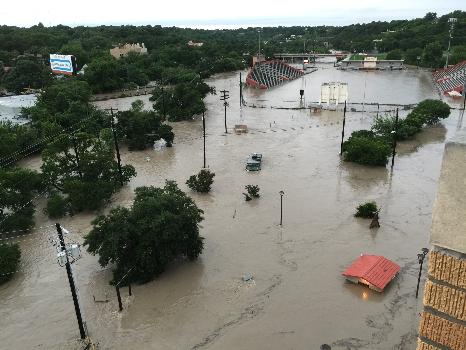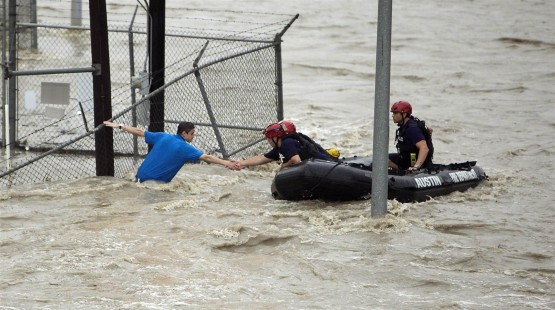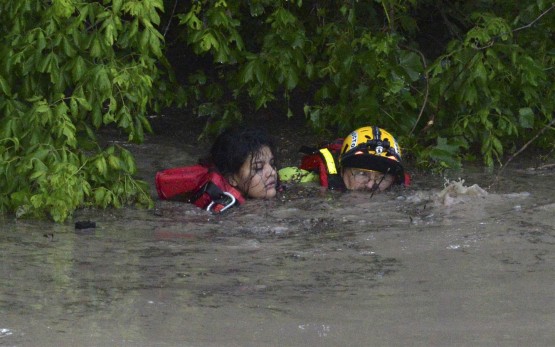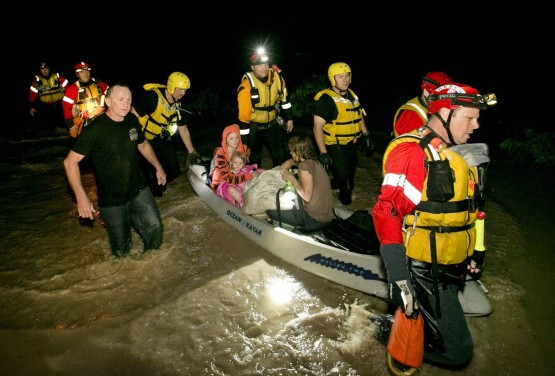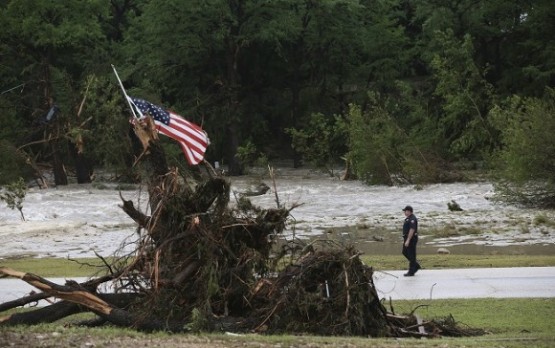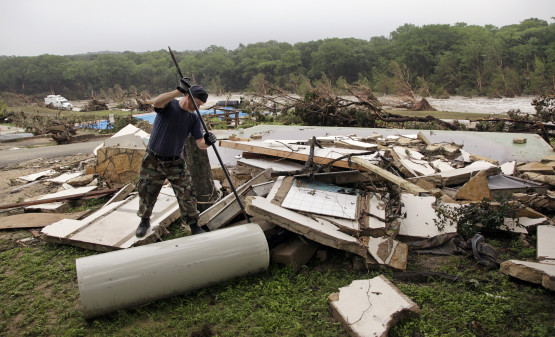Category Archives: Newsroom
Sarah Kliff argues that college newspapers provide good training for modern journalism:
Becoming editor-in-chief of my college paper broadened my perspective. I had to think about all the important ways to draw readers into stories: things like headlines and layout and photographs and illustrations. I spent lots of late nights in our basement office with the paper’s copy chief and lead designer. These produced an absurd number of inside jokes, as well as a granular understanding of how words and design have to work together for any publication.
Today I work for a website that looks really different from the one I edited in 2006. But my day-to-day job is surprisingly similar: generate interesting story ideas. Write about them. Use layout and design to draw readers in. And always try to do better the next time.

Photo by Milestoned 
The Daily Packer had no relationship with the university’s journalism school. More than that, very few actual journalism majors worked at the paper. From what I understand, they almost all thought it was beneath them. Which, to me, says something about journalism majors (or at least the ones at our school). Experience is experience, and clips are clips. There were multiple writers at city news outlets who actually cut their teeth at the Packer, though. It was actually pretty cool to see people graduate from the Packer to Colosse Weekly or even the Colosse Herald. I do wonder how the actual journalism majors did…
As we know newspapers have fallen on tough times. It falls into the category of things I hadn’t really thought about, but that would apply to college newspapers, too. Before becoming an opinion writer, I was a regular reader of it. I did what everybody did, which was pick up a copy on my way to class and read it while waiting for class to start. What else was there to do? Well now, of course, there is the smartphone, which has access to just about everything.
As such, the Daily Packer is no more.
Well, they do publish weekly. And there is a website that’s updated daily. Given that anybody accessing that site also has access to everything else on the Internet, though, I doubt it gets the attention that it used to. I would regularly have people talk to me about my columns, including strangers who recognized me from my pic. I wonder if that happens anymore. I’m afraid it probably doesn’t. But maybe it does. When they did a revamp of the site my last year, I did check the DP’s website every morning.
That wasn’t the only paycheck I collected from the Packer, though. I was also the delivery guy. That involved waking up at 5:30 every morning, walking across campus (past the DP building, which was never open for me to collect the writing paychecks) and driving a little go-cart and dropping off lots and lots of papers. It wasn’t a bad gig, all be told. I’d usually be done by 7:30 or 8 but was paid for 3-4 hours a day. (I could theoretically start later, but it was way easier to do it before there were lots of people walking around the campus.) The downside was that if I had a morning class, I didn’t have time to take a nap. I actually enjoyed my 8:30 Business Law class, but had a lot of trouble staying awake for it.
But I will always remember the degree of disgusting I felt whenever I finished. There was newsprint all over my hands. It was often really hot even before the sun rose, so I would be incredibly sweaty. I used an open blade to cut the binds, which meant that I would often cut my fingers (and almost all of my jeans had tears as a result). I don’t think there has been a ritual in my entire life as wonderful as that cold morning shower wiping off the newsprint, sweat, and sometimes blood.
We made $6 or $8 a column. Which was so little, and the office so far away, I rarely picked it up. The result was that some years ago, I found out that the university owed me over $100 in pay that I had never collected. The delivery money actually came out of a separate account – facilities, instead of student activities – and so they would mail me that check. Which wasn’t much money, but it was pretty great money.
 Students attempting to strip a state senator of his college degree for skepticism of global warming were unsuccessful.
Students attempting to strip a state senator of his college degree for skepticism of global warming were unsuccessful.
Ronald Nelson, a Memphis high school student, was accepted into every Ivy League school. He chose the University of Alabama.
Carols Lozada explains why conservatives give better commencement addresses than liberals.
States (like Connecticut) are often looking for a good excuse to go after homeschooling parents, and some Michigan legislators think they may have found one, and combined with recent events in North Carolina and revelations in Arkansas leave me concerned that “We need to crack down on homeschooling so the government can keep a closer eye on kids” is going to be a more oft-used argument.
Sady Doyle argues that interconnectivity and branding is ruining the Marvel popcorn movies.
I find this “Startup Castle” – with rules for residents covering everything from tattoos to exercise – to be intriguing. Though very much in a “not for me” way.
Freddie really put his finger on what sometimes causes me discomfort with the way that some people gush of Ta-Nehisi Coates.
David Lynch is back on board Twin Peaks.
AdultFriendFinder.com has been hacked. If exposed, divorces likely to follow…
A Mormon Temple in West LA is letting its lawn go brown. Brown lawns have a bad rap.
I don’t object to swapping out Andrew Jackson’s mug from our $20, or with Harriet Tubman being on a bill (or coin), though I am hoping that we hold out for a currency overhaul.
According to a new lawsuit, a veteran committed suicide after being given a terminal misdiagnosis by the VA. Also in Arizona, a suicide with a message, in front of a VA hospital.
Sometimes, compared to the alternatives in oil transportation, Pipelines aren’t so bad.
Chicago’s bond rating is now junk.
California farmers are starting to see the writing on the wall, and are offering to cut water usage by 25%.
Reddit users may be wondering “How did Cameron win? Nobody I know voted for him.”
Martin O’Malley is trying to suss out his position the The War… of 1812.
SurveyMonkey correctly called the UK election that others missed. Their different methodology could prove to be very important at cutting through American equivalents of Shy Tory and partisan weighing. Also, the importance of presidential non-candidate Emily Farris.
Obaman-turn-Tory (not quite) Jim Messina has some advice and warnings for the GOP. While most free advice from people who would never vote for your party is worth exactly what you pay for it, Marco Rubio should pin this on his wall.
Robert E. Kelly says that the Obama administration, like Japan, is getting tired of South Korea’s fixation on past wrongs.
The river came up past the magnolia tree
The swore we were three feet above the flood plane
Thank You, Lord, but we don’t need any more rain.
The sun won’t be shining any time soon
The ground swelling up like a water balloon
We got to find us a dry place to stay
Let’s hurry, before we all wash away
God bless our children, god bless this town
God keep the looters from coming around
Bless the hungry, the thirsy
But if it’s all the same
Thank You, Lord, but we don’t need any more rain
Gather the pictures, there isn’t much time
The man from the TV, he ain’t easin’ my mind
Eleven more inches? Is that what he said?
Someone grab the box print of Jesus hanging over the bed
God bless our children, god bless this town
God keep the looters from coming around
Bless the hungry, the thirsy
But if it’s all the same
Thank You, Lord, but we don’t need any more rain
There’s a chair in the treetops, a stove in the field
This time it was rough, I don’t think we’ll rebuild
I hate to see this old house meet its end
Sometimes it’s best startin’ over again
God bless our children, god bless this town
God keep the looters from coming around
Bless the hungry, the thirsy
But if it’s all the same
Thank You, Lord, but we don’t need any more rain
God bless our children, god bless this town
God keep the looters from coming around
Bless the hungry, the thirsy
But if it’s all the same
Thank You, Lord, but we don’t need any more rain
“Rhonda’s Prayer”
Dead End Angels
Written by Scott Melott
 The officer in the photo to the right was reprimanded for it.
The officer in the photo to the right was reprimanded for it.
Jessi Strieb wrote a book on cross-class marriages, and here’s an interview.
Here’s a map of all of the places Willie Nelson sings about. I want to see one for Counting Crows, which include a lot of songs about some person in some city who is sad and dispossessed.
Millenials are flocking to the suburbs.
But only certain types, says Jordan Weissman. There are class implications, because educated millenials are still moving to the city. Personally, I would guess this is a function of family formation as much as inequality.
Are they being driven to home ownership by rising rents?
More on the exurban revival.
The curse of the lottery winner may be overstated.
Benjamin Schwarz argues that urban planners are demolishing Britain’s working families.
Sayeth the Department of Energy: Drill, Baby, Drill.
The Guardian has a couple of articles on the privitization and gating of cities.
This will not only add economic efficiency to consumer products, but will be great for those of us who are allergic to waste.
I’ve been going back and forth on whether or not to do a post on the Duggars. Mike Rice’s submission on Duggar vs Dunham has pushed me towards doing so. My thoughts don’t quite track with the fiercest critics and defenders of the Duggars, though on the whole are more sympathetic to the former rather than the latter view. This is actually expanded upon from a comment I left on Facebook.
—
I have a weird capacity to be able to understand and, while definitely not condone or less pass, at least empathize a bit with some pretty amoral and immoral stuff. What sometimes gets me, though, is the combination of immoral (or amoral) and reckless.
Some argue whether or not we should extend or do away with statutes of limitations when it comes to sex crimes, but regardless most of us should think twice about holding a 14 year old indefinitely accountable for their actions at that age. We shouldn’t do it for murderers, and we shouldn’t do it for rapists. Thoughts contrary to this sometimes posit that sex crimes are particularly noteworthy because of recidivism, but that’s the same mentality that have given us our inhumane sex offender registries and the like. And in the case of Josh Duggar, it’s not clear that charges would be pursued anyway.
While I cannot quite condone the actions of Jim Bob Duggar in covering up the crime, I can certainly understand them and cannot say that in his shoes, I would do anything differently. Nobody wants their kids to go to jail even if they’re out at 18. Some – with more knowledge of the system than I have – say that treatment would likely be the recourse rather than prison. I don’t know if that’s true, and notably neither did the Duggars. An imperfect handling of the situation is understandable.
And faith is a thing that… well, it’s a thing. It doesn’t go away if you’re a sinner, and for all we know this has been weighing heavily on Jim Bob and Josh for a very long time. The events here have been used to try to argue against their faith or their church, but the case against the former seems rather weak to me. The same goes with ideology, up to a point. A writer for the Daily Beast said something to the effect of “It’s always the right-wing conservatives…” and was quickly presented with an army of counter-evidence. There’s still room to talk about how subcultures deal with sexual violation, however, but we should be wary of using a really broad stroke if we don’t want to get into conversations about how multiculturalism encourages us to look the other way.
The particulars of the subculture to which the Duggars belonged are more damning, however. and this is where things start getting more tenuous. Jim Bob Duggar’s church appears to have long-been comprised of people who tolerated outrageous sexual abuse (and it’s not just that guy). For a father with daughters to be able to look at that with a blind eye, does not lend itself to much in the way of the benefit of the doubt when it comes to other sexual violation of girls. It appears that there were serious problems here, and Jim Bob was more than happy to look the other way in the interest of spiritual morality.
The combination of these things, though, paint a darker picture. And the next bit puts me over the edge: If Jim Bob Duggar truly appreciated the gravity of the situation, and put his family first, he would not have gone the moralizing celebrity route. This isn’t about disagreeing with his views on homosexuality or sexuality more general. This is about disagreeing, in the strongest possible terms, to appointing himself a messenger for these things. Putting yourself in the limelight carries with it risks. Harboring dark secrets means that you don’t get to be a celebrity. You don’t get to draw attention to yourself. You don’t get to run for public office. You are rather obligated, for the sake of your family and keeping the secret that would devestate it, to keep your head low, provide for your family, and not make yourself a target (by, for instance, stating views that would have people opening every closet of your life in search of skeletons).
That Jim Bob didn’t do this, to me, speaks volumes. It tells me that he either didn’t understand the gravity of the situation, or was willing to put his family at risk for the cause of self-glory. It’s the thing that I really cannot find it within myself to cut him slack on, and it by extension colors my view of anything and everything else his family has done. The same applies to Josh, to a lesser degree, who risked his family’s standing and privacy by making himself a target with the Family Research Council and following in his father’s footsteps. Some of that can be attributable to his raising, which leads straight back to the head of his household.
In the end, to me, it all comes back to Jim Bob.
In September 2014 Lena Dunham’s memoir Not That Kind of Girl was released. In it, she talks of molesting her younger sister. There was some minor negative commentary, but Dunham was defiant, and seems to have suffered no loss of popularity because of it, and her show Girls was renewed in January.
It has come to the public’s attention that Josh Duggar, the oldest child on 19 Kids and Counting, molested 5 girls when he was a teenager, 4 of whom are his sisters. In contrast to the mild reaction to Dunham, a firestorm has erupted over Duggar. TLC has currently decided to suspend its airing of the shower.
These stories seem similar to me, yet there is a big difference in the public reaction. The question is: why? One possible reason is that Dunham is a woman, while Duggar is a man. It seems more wrong and predatory when a boy explores his curiosity with his younger sisters than when a girl does it.
However, I think it is more than that. I think the reason for the differing public reactions is that Dunham is “cool” and Duggar isn’t. Since Dunham is cool, any great criticism of her is going to make the critic seem uncool. However, since Duggar and his family are seen as weird, any criticism of him is going to be safe. As much as people cry about “punching down” people seem to enjoy it when it comes to Duggar.
Also, Duggar’s politics and his religious beliefs are far out of the mainstream, and he has actively worked against the expansion of LGBTQ rights. Since they are the current favored minority, people are going to do anything they can in order to poke a hole in Duggar’s credibility.
Duggar did these things as a minor. There is a reason why juvenile police records are sealed. The fact that these reports were redacted so cavalierly is a major concern to me. Duggar apologized to those he hurt, and he told his wife before they were married, and she still married him. It really isn’t anyone else’s business. Dunham put it in her memoir in order to make money from her molestation; Duggar was forced to talk about it publicly.
I have never watched 19 Kids and Counting, or Girls for that matter, so I have no vested interest in either show airing or not. I am only writing this post because the hypocrisy that people are showing is troubling. I wish I could say it was surprising, too…
 Texas is moving to become the newest state to allow terminally ill patients the ability to try non-FDA approved medications.
Texas is moving to become the newest state to allow terminally ill patients the ability to try non-FDA approved medications.
This story, of a Jewish student who was arrested for posting an image of a swastika he’d gotten while in India, raises some interesting questions about iconography and context. Leaving aside freedom of speech (ie even if we assume the legal right is there), are there words and images so offensive that there is no context in which they can be acceptably reproduced?
The DC Cinematic Universe looks like a real trainwreck. Bizarrely so, in my view, given that all they had to do was hire Paul Dini.
Dear DC Comics, cut this $#!+ out, please.
It feels a bit like corporations are going out of their way to make H1-B visas look bad, but the reality is that they have little reason to care about public opinion. More from Dave Schuler.
At CATO, Jason Kuznicki argues that property rights matter more for the poor than the wealthy.
Jeb Bush supports Puerto Rican statehood, but I have to agree with the National Review that it’s not presently a good idea for anybody involved.
Our wild 1,500 to be a barber.”>very regulated west.
Lydia DePillis looks at Puerto Rico to see what a massive minimum wage hike to $12 will do, because they had a hefty rise from $2.03 to to $3.35. It tries to explain away a whopping 9% drop in employment (Might have happened anyway!) and emigration (It’s good for people to leave!) and despite admitting at the end that raising the minimum wage didn’t do its economy much good. Despite an optimistic tone, it does little to alleviate my concern about what a $12 minimum wage would do to Mississippi.
The territory is raising its taxes to settle a budgetary shortfall, but Ike Brannan of the Weekly Standard argues that it should be allowed to declare bankruptcy. Jeb Bush wants statehood, but while that would fix the “can’t declare bankruptcy problem, I have to agree with the National Review that it’s not presently a good idea for anybody involved.
When should men wear short pants?
There’s something wrong with David Brooks.
Joe Battenfield argues that if things don’t work out with Hillary Clinton, the Democrats can always go with Kerry. Before Mitt announced he wasn’t running, I was pondering the violently (if unlikely) dull prospect of a Kerry-Romney election.
Muslim shopkeepers in China are being required to sell alcohol and cigarettes.
Conservatarian values collide on the question of guns and employment. Specifically, a Tennessee law that would bar employers from taking action against employees who bring a gun to their work place. There was a law passed that allowed people to legally take their guns on to others’ property as long as they kept it in their car. The law was amended to prevent employers from firing employees for doing this.
Dustin Siggins and Doug Mataconis argue that the law goes too far because it infringes on the property rights of the employer. Jazz Shaw argues:
There is also the question of where the employer’s “property” ends, which Dustin correctly notes in his piece. True, the parking lot is the property of the employer, but does that make the employee’s automobile their property as well? You either allow employees to park in your parking lot or you don’t. What they have in their cars – assuming it’s legal – is really their business if it’s not being brought into the workplace and potentially affecting the owners and staff. In a parallel case, many employers with security concerns do not allow workers to bring their cell phones into the office because of the camera and audio recording capabilities of modern phones. But they pretty much universally allow the workers to lock them in their cars while at the office. And most importantly, that scenario applies to a device which isn’t even covered by your constitutional rights.
This law seems to me to have been a good compromise. The employer can bar carrying weapons in the workplace, but the employee’s car is not the workplace. And punishing them for such storage is an unreasonable burden on their constitutional rights.
On the property rights question, I am actually squarely on Shaw’s side. When I was substitute teaching, I was technically violating city law and school policy because brought tobacco on to the premises. However, my belief is that since it stayed in the car, it was more on my own property than theirs until or unless I took it out of the car. (Which, also technically I did, but only to transport it off school grounds so that I could smoke, but we’ll forget that for a moment.)
The conflict to me is not between the Second Amendment and property rights, but the Second Amendment and the right of employers to hire and fire as they please. And here, I actually side with the employers. While I would criticize any employer who refused to hire people who (for instance) own guns at home, I don’t believe that gun ownership should be – at the current time – a protected class. If such policies become sufficiently widespread, then I might reconsider. Such policies are likely to be more widespread when it comes to “No guns in your car” policies, but the rationale for such a policy is notably more acute.
So my split-the-baby solution is that, given that Tennessee is an employment-at-will state, I would allow them to fire employees under the EAW doctrine. However, I would not view that particular reason for doing so as a “For Cause” firing. Meaning, the employee would be eligible for unemployment provided that at no point they presented a danger to anyone else (by either taking the gun out of the car, or threatening to).
Canada made the decision to close one of its borders in the night-time hours, which left residents of an eastern Alaska town in a lurch because there is no emergency care otherwise. Fortunately, they came to an arrangement.
According to Brookings, fracking is responsible for 47% of the fall in natural gas prices.
Everything you ever wanted to know about Tabasco Sauce. (Well, fifteen things.)
If you’re looking for a way to get rid of ants, you can’t get rid of them by getting rid of gravity.
According to a new book, addiction may not be what we think it is.
David Shultz wants to know if you’ll be able to read modern-day articles in 1,000 years, with an eye towards antiquated hardware. To answer his question, I think the answer is “yes” for text, due in large part from the transition from binary to marked up text. You won’t necessarily have the formatting, but you’ll have something readable. I’m less sure about image files, and skeptical about anything dynamic like video games or interactive anything.
Tom Lindsey writes about Texas’ ongoing effort to make college genuinely affordable.
Javier Grillo-Marxuach attributes the majesty of modern prestige television to bad parenting, MTV, and ADD-style editing.
Maybe I should talk less about Kansas City, and more about Fresno?
Discovered during my research: How America was named.
Ben Schwartz argues that we are in an age of a comedic bubble and satirical excess.
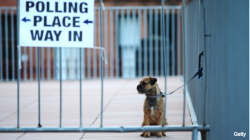 The “cadillac tax” was billed by Jonathan Gruber as a backdoor to getting employers out of healthcare. Some House Democrats want to quash it.
The “cadillac tax” was billed by Jonathan Gruber as a backdoor to getting employers out of healthcare. Some House Democrats want to quash it.
President Obama is touting community colleges. That’s not the particularly cool part, though. The cool part is that he’s doing it in South Dakota. Thank you, Mr. President.
Some have grumbled at the obligation we have incurred by providing defense for the Marshall Islands, but Greenpeace says they’ve paid a price for it. And for those worried about the Maersk Tigris, while the administration and the Pentagon punted, it was released, and we’ve taken to escorting ships.
Norway is reducing the incentives to buy electric cars, and in response to Charlie Hebdo retiring it’s blasphemy law.
PRI shares the story of an American who saved 250,000 people during the Armenian genocide.
Putin and Medvedev have been comparing their annexation of Crimea to the reunification of Germany, but some historians take issue with that.
Maybe it’s just me, but if you’re somebody that has (a) stolen a bike and (b) disemboweled a Portland man, you are a “Disemboweler who stole a bike” rather than a “Bike thief to disemboweled a Portland man.”
One of Montana’s most wanted is caught when he “likes” his most wanted poster on Facebook.
A woman’s daughter dates her mother to kiss a random, good-looking stranger. Which she does, and then tries to use social media to catch his attention, and caught his wife’s instead.
An aide to California Attorney General Kamala Harris is evidently part of a secret society dating back to… well there’s some confusion over that.
Montana joins New Mexico in clipping the wings of asset forfeiture.
An employee at a Waffle House in Georgia was caught on camera pleasuring himself. The only thing missing from this perfect story are the words “… in celebration of his favored SEC team winning a championship.”
Jesse Walker wrote an opinion piece on Jade Helm 15 for the LA Times, which a publication in the UAE reproduced… except they cut off the second half, leaving it on a pretty ominous note.
Liberland, mentioned last week, had a good run, but that run is at an end as the nation was invaded and its president arrested by Croatia. Here’s an interview.
A flight from Florida to Portland was diverted to Salt Lake City after a tantrum by a teenager with autism who wanted/needed hot food.



